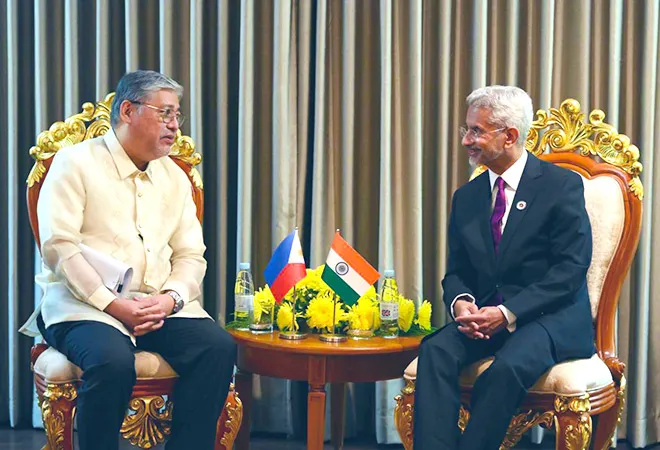
The Philippine Foreign Affairs Secretary, Enrique Manalo, arrived in India on 27 June to take part in a four-day visit upon the invitation of External Affairs Minister S. Jaishankar. Both officials held their fifth meeting of the Philippines-India Joint Commission on Bilateral Cooperation. Additionally, since his arrival in New Delhi, Manalo has also been engaging with various distinguished Indian foreign affairs institutions such as the Indian Council of World Affairs (ICWA) and the Observer Research Foundation (ORF). While the Philippine foreign affairs secretary’s visit is aimed at reviewing and enhancing the status of the Philippine-India bilateral partnership, it also comes against the backdrop of an intensifying regional geopolitical landscape.
In a region that is increasingly defined by cooperation based on like-mindedness, shared interests, and common concerns, the Philippines-India bilateral relationship serves as a crucial element to the stability of the Indo-Pacific. Both democratic countries converge in securing the post-Second World War order, while also strengthening national capacities towards territorial defence and maritime security. However, throughout nearly 15 years, since the beginning of the 21
st century, the relationship between Manila and New Delhi remained cordial at best despite the conducive strategic environment they both operated in.
Both democratic countries converge in securing the post-Second World War order, while also strengthening national capacities towards territorial defence and maritime security.
The problem, however, centred on the lack of attention at the domestic decision-making level. While in the first two decades since the end of the Cold War, New Delhi’s capacity to translate its growing material capabilities into robust external policies was limited, it still endeavoured to illustrate its willingness to forge robust ties with its Southeast Asian neighbours. However, among the Southeast Asian countries, the Philippines was not able to significantly operationalise the idea of establishing close strategic ties with India during this period, unlike its other immediate neighbours such as Vietnam, Singapore, Myanmar, and Indonesia. This can be partly explained by the domestic perception of Manila’s leadership between 2001 and 2016, which steered clear of pushing for the diversification of strategic partnerships beyond traditional and immediate relations.
However, since 2016, ties between both the Philippines and India received a much-needed boost due to former President Rodrigo Duterte’s desire to prioritise the diversification of Manila’s strategic partners, particularly in the realm of security. This coincided greatly with the notable developments spearheaded by Prime Minister Narendra Modi towards Southeast Asia through the Act East Policy of 2014. The period saw a series of important milestones, such as regular high-level visits between the senior officials of both countries,
a first-ever quadrilateral joint naval exercise in the South China Sea in 2019, with the inclusion of the US and Japan, and the sale of the BrahMos supersonic cruise missiles in 2022. It was also during this period when India
provided US $500,000 to the Philippines amidst the devastating siege in Marawi in 2017, which was the first time ever India provided any country with aid, directed towards counterterrorism efforts. Moreover, in 2020, the Philippine Navy flag officer in command Vice Admiral Giovanni Carlo Bacordo highlighted how the expansion of naval cooperation with India is crucial to keep the “
seas safer and more secured for everyone”.
This period marked a new beginning for the bilateral relationship between Manila and New Delhi with both countries recognising the value of each other’s partnership. More importantly, Manila has also embraced the idea of incorporating India in its strategic calculus for issues of traditional security and defence, which was a stark contrast to how relations were in the past—often limited to areas of low politics. Furthermore, with the electoral victory of President Ferdinand Marcos Jr. in 2022, it is likely that the momentum will sustain between both countries for two very important reasons.
Manila has also embraced the idea of incorporating India in its strategic calculus for issues of traditional security and defence, which was a stark contrast to how relations were in the past—often limited to areas of low politics.
First, in a bid to prioritise Philippine territorial defence and maritime security, Marcos Jr. has been intensifying Manila’s security engagements with its traditional ally, the US. From the expansion of the Enhanced Defence Cooperation Agreement (EDCA) to the establishment of a framework for joint maritime patrols in the South China Sea, the Philippines and the US are continuously endeavouring to deepen and broaden the scope of their partnership. This eventually resulted in the inauguration of trilateral sea drills with Japan and a potential quad-like arrangement with Australia, which has the potential of narrowing the operational gaps within the US hub-and-spokes network in the Indo-Pacific for better functionality in securing the established order.
Amidst this reality, there is an opportunity for Manila and New Delhi to work closely within such an extended multilateral framework. While India is a major defence partner of the US, it also shares a global and strategic partnership with Japan and a comprehensive strategic partnership with Australia. All four major Indo-Pacific democracies are engaged in various bilateral and multilateral arrangements with the purpose of safeguarding the peace and stability of the Indo-Pacific. Therefore, the chances of synergising efforts towards area-specific cooperative frameworks between the Philippines and India in the context of a wider multilateral strategic network with the US, Japan, and Australia are feasible, given that its basic operationalisation was witnessed in 2019. Such activities can be replicated and remodelled in the future given the deep convergences of all countries involved.
All four major Indo-Pacific democracies are engaged in various bilateral and multilateral arrangements with the purpose of safeguarding the peace and stability of the Indo-Pacific.
Second, while the Philippines has chosen to deepen its alignments with the US hub-and-spokes system, it remains steadfast in maintaining and managing ties with China. On 5 May, Marcos Jr. emphasised that the Philippines’ desire to enhance its maritime security capabilities is in
no way aimed at disengaging and cutting ties with China. This was again
reiterated on 9 June when the Philippine President highlighted how Manila will not shift away from China. Similarly, during his lecture Indian Council of World Affairs (ICWA) on 27 June, Manalo explained how the maritime dispute with China
does not define the overarching nature of bilateral ties between Manila and Beijing. Furthermore, as an illustration of the Southeast Asian country’s unwillingness to be engulfed in bloc politics, the Philippine National Security Council
noted that Manila does not want to meddle in the tensions brewing in the Taiwan Strait.
This perspective of Manila converges well with New Delhi’s consistent adherence to strategic autonomy. Being the fifth-largest economy with the world’s largest population and a formidable military, India has opposed engaging in bloc politics; rather, it has constantly pushed for cooperation based on common concerns, interests, and respect for domestic sensitivities. While India continues to face tensions with China along the Line of Actual Control (LAC), it keeps diplomatic channels open, along with the emphasis on not taking part in any rigid coalition against a particular country. Given this level of political maturity, Manila will be able to maximise its ties with a rising India without worrying about falling deeper into the US-China power competition. Therefore, India can serve as a strategic buffer amidst Manila’s desire to manage relations with China on one hand and enhance security ties with the US alliance network on the other.
While India continues to face tensions with China along the Line of Actual Control (LAC), it keeps diplomatic channels open, along with the emphasis on not taking part in any rigid coalition against a particular country.
Given this reality, the Philippines and India are faced with an opportunity to maximise the potential of their bilateral partnership. Positive signs have been noted towards the furthering of strategic cooperation in both the traditional and non-traditional security realms. Among such areas is cybersecurity. Given Manila’s limited cyber-defence capabilities, it is crucial for the Southeast Asian country to utilise its security partnerships to further this goal. In this light, India
offered operational cyber security training to the Philippines military. The Philippines and India also
discussed the possible deployment of an Indian defence attaché in Manila, indicating their desire to explore new areas of security cooperation. Therefore, it is imperative for both states to continue maximising the utility of their emerging partnership given the strategic uncertainties plaguing the Indo-Pacific. However, consistency remains the most important component in strengthening any form of strategic cooperation. Thus, the need for both countries to maintain consistent engagements is crucial to further deepen and broaden the scope of their burgeoning ties.
Harsh V. Pant heads the Strategic Studies and Foreign Policy Programme at Observer Research Foundation
Don McLain Gill is a Philippines-based geopolitical analyst, author, and lecturer at the Department of International Studies, De La Salle University (DLSU).
The views expressed above belong to the author(s). ORF research and analyses now available on Telegram! Click here to access our curated content — blogs, longforms and interviews.



 The Philippine Foreign Affairs Secretary, Enrique Manalo, arrived in India on 27 June to take part in a four-day visit upon the invitation of External Affairs Minister S. Jaishankar. Both officials held their fifth meeting of the Philippines-India Joint Commission on Bilateral Cooperation. Additionally, since his arrival in New Delhi, Manalo has also been engaging with various distinguished Indian foreign affairs institutions such as the Indian Council of World Affairs (ICWA) and the Observer Research Foundation (ORF). While the Philippine foreign affairs secretary’s visit is aimed at reviewing and enhancing the status of the Philippine-India bilateral partnership, it also comes against the backdrop of an intensifying regional geopolitical landscape.
In a region that is increasingly defined by cooperation based on like-mindedness, shared interests, and common concerns, the Philippines-India bilateral relationship serves as a crucial element to the stability of the Indo-Pacific. Both democratic countries converge in securing the post-Second World War order, while also strengthening national capacities towards territorial defence and maritime security. However, throughout nearly 15 years, since the beginning of the 21st century, the relationship between Manila and New Delhi remained cordial at best despite the conducive strategic environment they both operated in.
The Philippine Foreign Affairs Secretary, Enrique Manalo, arrived in India on 27 June to take part in a four-day visit upon the invitation of External Affairs Minister S. Jaishankar. Both officials held their fifth meeting of the Philippines-India Joint Commission on Bilateral Cooperation. Additionally, since his arrival in New Delhi, Manalo has also been engaging with various distinguished Indian foreign affairs institutions such as the Indian Council of World Affairs (ICWA) and the Observer Research Foundation (ORF). While the Philippine foreign affairs secretary’s visit is aimed at reviewing and enhancing the status of the Philippine-India bilateral partnership, it also comes against the backdrop of an intensifying regional geopolitical landscape.
In a region that is increasingly defined by cooperation based on like-mindedness, shared interests, and common concerns, the Philippines-India bilateral relationship serves as a crucial element to the stability of the Indo-Pacific. Both democratic countries converge in securing the post-Second World War order, while also strengthening national capacities towards territorial defence and maritime security. However, throughout nearly 15 years, since the beginning of the 21st century, the relationship between Manila and New Delhi remained cordial at best despite the conducive strategic environment they both operated in.
 PREV
PREV



